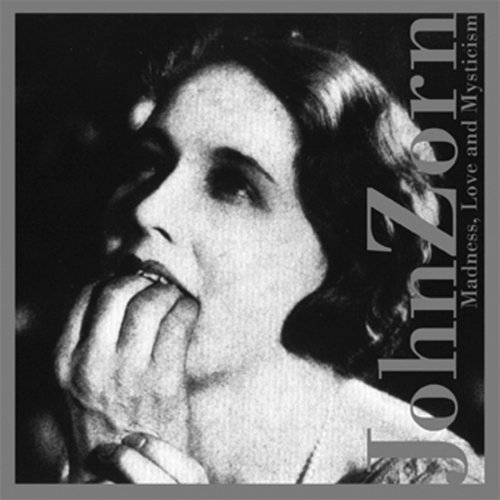
John Zorn - Madness, Love and Mysticism (2001)
BAND/ARTIST: John Zorn
- Title: Madness, Love and Mysticism
- Year Of Release: 2001
- Label: Tzadik
- Genre: Classical
- Quality: FLAC (tracks)
- Total Time: 51:59
- Total Size: 210 MB
- WebSite: Album Preview
Tracklist:
1. Le Mômo (16:08)
2. Untitled (15:11)
3. Amour Fou (20:09)
1. Le Mômo (16:08)
2. Untitled (15:11)
3. Amour Fou (20:09)
John Zorn's chamber pieces are now becoming as much the rule as they are the exception in his ever-expanding catalog of works. This trio of pieces is -- even for him -- among his most provocative and most musically noteworthy. The contents are "Le Mômo," for violin (Jennifer Choi) and piano (Stephen Drury); an untitled cello sonata (featuring cellist Erik Friedlander); and "Amour Fou" for the entire trio. First up is "Le Mômo," named after French poet and dramatist Antonin Artaud's own work, Artaud, le Mômo. The musical palette that Zorn assembles for this work is deceptive at first, as both pitch and tonal interactions between the two instruments speak in a limited vocabulary, but only for the first three minutes where the harmonic range expands across the entire tonal scale. There are passages of stark, brooding beauty where Drury plays alone, juxtaposed with dynamic shifts in color and texture where Choi is in full-challenge assault mode on harmony. In fact, Zorn largely does away with it with few exceptions. The dizzying array of changes in tempo, mode, tonality, and timbre are staggering, and the piece seems as full of anarchy as one of Artaud's own fragmentary poems. But herein lies the beauty: This work is anything but random; it is precise and almost pointillistic in its structure, as flatted fifths slam quite comfortably into arpeggios of pure intensity on both instruments. The overall tone of the work is a tribute, but there is elegy written across its body as well. "Untitled" for cello is among the most beautiful of Zorn's composed works for strings. He examines, through a series of notational strategies, the elemental nature of timbral structure and the essence of the cello's tonal limits. In short, he puts Friedlander through the ringer both dynamically and dramatically, moving him through serial and overtonal passages that seem to eliminate meter, time, and interval. However, like "Le Mômo," this is largely a work based on a sophisticated and mysterious lyricism that is singular to Zorn's work. What appears atonal in a moment gives way to profound and shimmering beauty in the next. The work is dedicated to Joseph Cornell, the solitary artist who created hypnotic, delirious boxes full of the most surreally gorgeous minutiae; they were great works of obsession on love, its lack, and loss, and they changed our concept of visual art to an extent we can't even measure yet. Finally, "Amour Fou," Zorn's tribute to obsessive, mad love for trio is a hint toward his influences from Scriabin to Messiaen musically and from Andre Breton to Georges Bataille in literature. It's the closest to a narrative work on this record; its body is constructed of essentially three movements, and all of them would have a dynamic list as long as Zorn's arm if they were written down. The piano seems to be the key to undertaking the piece harmonically. It creates shifts in mode and interval just slightly ahead of the other instruments and presents to them the color palette they work from tonally. Dynamics are all-important in this work, and follow the nature of love from its inception to the fruit of its obsession, an apex and descent into total dissolution as mad as the immersion in love. Friedlander's cello provides the male voice, Choi's violin the voice of the mystical feminine, and Drury's piano the landscape upon which they interact. Here again, Zorn's lyrical genius holds together a work of rambling proportion and reins it in on theme and motion notated by some of the most adventurous counterpoint composed in many years. The work is full of sad, frenetic beauty and pathos. Ultimately, Zorn has proved all the critics wrong; he is not merely "dabbling" in classical music. In fact, as this trio of selections proves, he is out to take it over for good. Let's hope he succeeds. © Thom Jurek
As a ISRA.CLOUD's PREMIUM member you will have the following benefits:
- Unlimited high speed downloads
- Download directly without waiting time
- Unlimited parallel downloads
- Support for download accelerators
- No advertising
- Resume broken downloads


